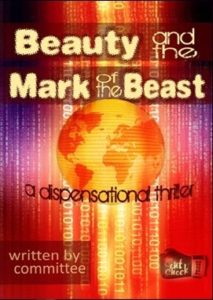Reading Is Worship 6: Curing Weirdness-Idolatry
In a moment Iâll suggest solutions to the potential weirdness-idolatry I identified last week.
This comes after the conflict over some costume-wearers being kept from entering last monthâs American Christian Fiction Writers awards banquet.
As before, Iâm choosing to ignore who said what to whom, and whether some costumers were allowed at the banquet and others forbidden. What matters more is how we respond now, and how we may correct wrong assumptions.
 But first I have questions for Christian-speculative readers, because even though I am one of you, I am perplexed about you.
But first I have questions for Christian-speculative readers, because even though I am one of you, I am perplexed about you.
- How come many readers insist on being âweirdâ and âcounter-culturalâ as their prime directive? Dare I say it, but forget for a moment the truth that manâs chief end is not to rebel against perceived majority culture, but to glorify God and enjoy Him forever. Even apart from that, what lasting joy is found in emphasizing a clichĂ©d teenage attitude against The Establishment? Donât we first love these stories for the joy they give?
- With âweirdâ stories firmly established in the mainstream, with everyone computer-literate and brandishing smartphones, with the âgeeks inheriting the Earthâ â why this old, traditional, backwards notion that fantastic stories are indeed narrow and niche, and that we want this? Why buy the (perceived) assumptions of our critics?
- As many of us enjoy saying, many âsecularâ novels and films do fine in reflecting Biblical truths and beauties. If thatâs true (and it is), why do we even need Christians offering even more speculative stories? Non-Christian authors already have this covered, thank you very much â and they may freely and non-hypocritically behave like non-Christians. But especially if professing Christians react to conflict or slights in ways identical to non-Christiansâ reactions, what exactly is the point of us?
- In many responses Iâve seen to the cosplay controversy, why do many (not all) critics operate on a purely secular level of discussion? Have we really mastered the truth of being like our Savior, not just writing about or for Him, so that now we can move on? And based on that secular level of reaction, why would anyone expect the books we want to market to be any more âChristianâ or unique than our own behavior?
Now for cures. They will come in four parts, corresponding with each of those challenges:
1. See âweirdnessâ as the true Normal, a given element of Godâs epic Story.
 In April I argued this, in the swatting-off-a-nuisance column Please Quit Calling It âWeird.â
In April I argued this, in the swatting-off-a-nuisance column Please Quit Calling It âWeird.â
The Bible is the most incredible Book ever, full of incredible stories and themes: battles, miracles, the nastiness of sin, rising nations, fantastic creatures, and the central Story of Godâs creation of man, manâs fall, and Godâs plan to save His creation. Over all of that is the Storyâs infinite Author and Hero. Heâs infinite, incredible, creative, loving, and holy.
So I would ask why many Christian stories donât better reflect these themes. At present, most Christian novels are from non-speculative genres that include God as a supporting character. Thatâs not evil, of course. But they do tend to be detached from the greatest Story of the Bible â the Gospel. They may be fun to read, but how do they help us in our fantastic reality, in which this incredible God is always working, even in small ways, to save sinners and redeem His creation? How do they remind us of the true Story?
This is a more-Biblical perspective than the usual â and, as Mike Duran notes, immature-sounding â approaches of complaining and glorying in any âweirdnessâ for its own sake. If we do that, why even call ourselves Christians? Not Christian readers, but Christians at all.
2. Recognize that fantasy and sci-fi are the dominant, default story genre.

Since the last time I made this point on SF, superhero-fantasy films The Avengers and The Dark Knight Rises have arrived on the top-20 list.
Top-20 film lists constantly show fantasy/sci-fi at the top. The most-read books on Earth include the Bible (the first âfantasyâ epic), and fiction such as The Lord of the Rings and Harry Potter. It is not fantasy stories, but non-fantasy ones, that are new and strange.
So if you pretend fantasy is still a niche, you have stuck your head in the sand. Might as well say a muffled hello to the supposed narrow-minded Christian publishers in there with you.
3. Ask God to help our friendships with spiritual family, not only our stories.

âLord, open the Christian fiction publishersâ eyes”?
Letâs assume at this banquet, other people were dressing up in Amish or prairie-romance garb, and that the conference does have a double standard. Even if that were all true, do we respond with appeals to Rights, a persecution/victim complex, or secular reasoning that makes no gracious, winsome effort to present our favorite stories as Biblically based?
If not, then frankly weâre no better than unbelievers. We have no reason to read, ask for, or try to write and publish âChristian speculativeâ stories. Secular stories are all we need.
If we claim God as our Author and Christ as our Hero, then despite any actual dislike by others of Christian speculative stories, we should want to love our brothers and sisters in Christ, find common ground, and reach out to them. Demanding our rights (even if they are legitimate) to dress up in super-suits when we like is a far lesser need, if itâs a âneedâ at all.
4. Keep clarifying and remembering why we truly love fantastic stories.
I must admit this: much of Christian-speculative rhetoric is not persuasive. Many blogs and other materials advocating more fantasy/sci-fi/etc. in Christian fiction simply assume that need is self-evident. Itâs not. There are very understandable, even good reasons against it:
- There arenât enough active readers to make publishers choose a switch in emphasis.
- Readers (many of them evangelical women) evidently still want escapism that relates to their desires, including sheltered religious communities, shallow spiritual explorations, and idealized histories â not vast fantastic worlds, heroes, and epic mythologies.
- Many advocates seemingly favor promoting their own novels (or at best, preserving the niche market) above growing the genre.
Arguing against all these on secular worldly terms merely compounds the problem. We must prayerfully reject our own impulses to indulge in anti-Biblical âescapism.â Claims that banning books is âlegalismâ donât cut it. âWhatever does not proceed from faith is sinâ (Rom. 14:23). If we want speculative stories apart from faith, we are sinning.
Thatâs the negative. Hereâs the positive.
Unlike other genres, fantastic stories may more directly present Godâs nature.
 They better reflect the whole Gospel and Biblical worldview, that our âfelt needsâ are not all there is, and that even good gifts like human relationships and romance are secondary to the true myth of Christ rescuing His creation.
They better reflect the whole Gospel and Biblical worldview, that our âfelt needsâ are not all there is, and that even good gifts like human relationships and romance are secondary to the true myth of Christ rescuing His creation.
They remind us that this age is not our home. Rather, we await a true eternal fantasy world, the New Heavens and New Earth (Rev. 21)!
If in conflicts we merely assume these truths, we are either poor communicators or havenât seriously considered these truths ourselves. Let us saturate ourselves in them. Read and delight more in Scripture, Godâs Story. And imitate its Author.
How can we better handle real (or perceived) slights against fantasy fans?
In what ways are you discerning your story-enjoyments in light of Godâs Story?
What other âweirdnessâ-idolatry cures would you suggest?


































 Yes, in Doctor Whoâs midseason finale, âThe Angels Take Manhattan,â Rory even spread his arms wide as he stood atop that roof ledge, ready to give his life to save not only himself from a lonely, imprisoned future, but the city of New York.
Yes, in Doctor Whoâs midseason finale, âThe Angels Take Manhattan,â Rory even spread his arms wide as he stood atop that roof ledge, ready to give his life to save not only himself from a lonely, imprisoned future, but the city of New York. Throughout Doctor Whoâs Pond-centric episodes, viewers watched Rory and Amy grow up, fall in love, marry each other, become parents, lose and find their child, change jobs, and fight to save their marriage from monsters of normal life (and actual monsters). Finally, they were ready to die together in one otherâs arms, after Amyâs potentially final words:
Throughout Doctor Whoâs Pond-centric episodes, viewers watched Rory and Amy grow up, fall in love, marry each other, become parents, lose and find their child, change jobs, and fight to save their marriage from monsters of normal life (and actual monsters). Finally, they were ready to die together in one otherâs arms, after Amyâs potentially final words:

 Still, Moffat kept head-faking: does Amy really prefer the Doctor over her husband? At first it was annoying. But now that their arc is done I realize what he intended all along. The trope is this: couples arenât meant to stay in stable relationships, so a Breakup is inevitable. Any time now, itâs over! Back to the angst and wandering, another Love Interest and male cast member! Itâs the No. 1 Romance Rule of Television! And Moffat laughed in the tropeâs face.
Still, Moffat kept head-faking: does Amy really prefer the Doctor over her husband? At first it was annoying. But now that their arc is done I realize what he intended all along. The trope is this: couples arenât meant to stay in stable relationships, so a Breakup is inevitable. Any time now, itâs over! Back to the angst and wandering, another Love Interest and male cast member! Itâs the No. 1 Romance Rule of Television! And Moffat laughed in the tropeâs face.






 173 pages of pretty non-stop humor and action. There are very few pages in which somebody isn’t either getting punched, shot, implanted with a microphip, falling into or out of love, falling off a light stanchion, feeling conflicted about something, or else doing or thinking something funny.
173 pages of pretty non-stop humor and action. There are very few pages in which somebody isn’t either getting punched, shot, implanted with a microphip, falling into or out of love, falling off a light stanchion, feeling conflicted about something, or else doing or thinking something funny.


 Unfortunately, thatâs not the only angle here. Having attended at least one ACFW banquet, I can confirm that the rules, written or unwritten, lean toward formal wear, not cosplay. The
Unfortunately, thatâs not the only angle here. Having attended at least one ACFW banquet, I can confirm that the rules, written or unwritten, lean toward formal wear, not cosplay. The 











